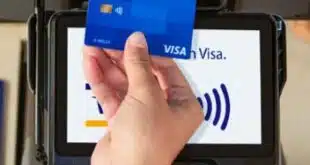With help from Discover Financial Services, regional electronic funds transfer networks this week took a major step toward ending a dilemma over how merchants can route PIN-debit transactions made on chip cards through EFT networks and still meet the Durbin Amendment’s transaction-routing requirements.
Previously, the main routes available for Europay-MasterCard-Visa (EMV) chip card debit transactions were through the Visa and MasterCard networks. Visa Inc. and MasterCard Inc. own the core EMV technology. While both Visa and MasterCard said they would make their technology available to the regional networks, most of the networks rejected those offers.
The PIN-debit EMV issue boiled over in recent months for two reasons. Visa, MasterCard, Discover and American Express Co. are nudging the U.S. toward adoption of EMV chip card as the successor to the easily counterfeited magnetic-stripe credit and debit card. But Federal Reserve rules implementing the Durbin Amendment in 2010’s Dodd-Frank Act require all debit cards to offer the merchant a choice of at least two unaffiliated networks on which to route transactions.
That’s fairly easy to do with mag-stripe cards, but not so easy with chip cards. Currently, each EMV application is proprietary to a card brand, so while multiple payment methods may be available on the app, it supports only one network. Apart from Visa and MasterCard, only the Houston-based Pulse EFT network, which Discover owns, had the technology to route EMV transactions.
On Tuesday, the Secure Remote Payment Council (SRPc), whose members include many of the largest EFT networks, announced it would adopt a common U.S. debit application identifier by licensing Discover’s D-Payment Application Specification (D-PAS).
Paul Tomasofsky, SRPc president, says SRPc had been looking for an EMV solution for about a year. Originally, the council considered developing its own solution, but rejected that option due to the high cost and considerable time it would require.
The council liked the fact that the Discover solution had been in the market for four years and already has millions of EMV cards from international issuers using it, Tomasofsky says. In addition to Pulse, Discover also owns the Diners Club International network, which operates mostly outside the U.S., including in many countries where EMV is the standard.
The way the deal works is that Riverwoods, Ill.-based Discover will make its technology available at no cost to the SRPc. Council members will form a new legal entity with a governing board consisting of network members. That board will establish its own operational rules, according to Troy Bernard, global head of chip payment products for Discover.
The SRPc looked at the options proposed by Visa and MasterCard, and while it found some functionality missing, the biggest obstacle they presented was the governance of the technology, Tomasofsky says.
“Visa and MasterCard set the terms of licensing and there is no guarantee there would not be a change in the future,” says Tomasofsky. “With Discover, they are contributing their technology to a consortium of our members that will govern the use. No one member will have the ability to alter the terms of the agreement.”
Still, the agreement is not exclusive and individual member networks also could work with Visa or MasterCard if they choose. And the SRPc has invited Visa and MasterCard to join the coalition as well, Tomasofsky says.
Coalition members include 10 of the largest EFT networks, which account more than half of U.S. PIN-debit transactions: AFFN, ATH, Co-Op Financial Services, Jeanie, NETS, NYCE, Presto!, Pulse, Shazam, and Star. Tomasofsky expects additional networks to join in the future, although he wouldn’t name them. The largest PIN-debit network missing from new coalition is Visa’s Interlink. Also missing are MasterCard’s Maestro and Fiserv Inc.’s Accel/Exchange.
Discover’s Bernard says there are no routing stipulations. Under Durbin, it is up to merchants to decide how a transaction made on an EMV debit card will be routed. If the merchant chooses an EFT network associated with the SRPc, the Discover technology will allow the transaction to be routed “just like a mag-stripe transaction,” he says.
The EMV standard is widely deployed in Europe, Asia and now Canada. Bernard says the SRPc agreement is for U.S. transactions only. Transactions made on U.S-issued cards at foreign locations must be routed through the international networks, he says.
n
n





